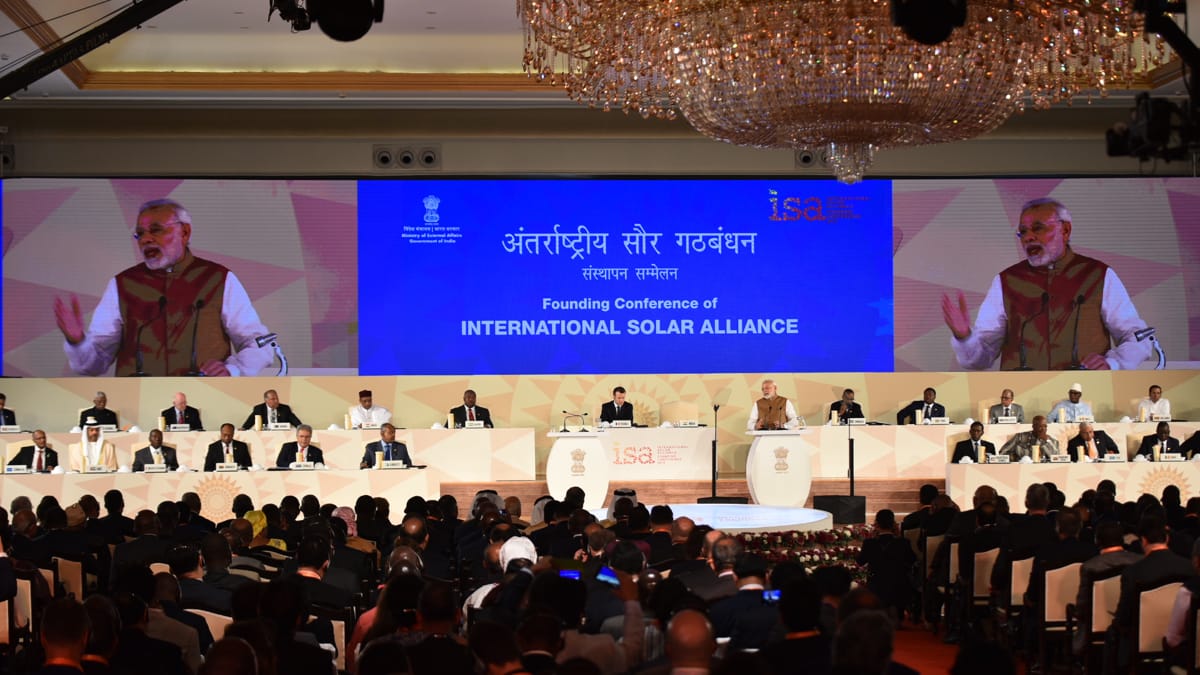Over the past decade, India has significantly bolstered its collaboration with African nations in the renewable energy sector. Harnessing the continent’s abundant solar potential is seen as crucial for economic growth and sustainable development.
Central to this effort is the International Solar Alliance (ISA), co-led by India and France and established at the Paris climate change negotiations in 2015 to promote solar energy deployment, facilitate access to finance, and foster technological innovation.
India’s role in the ISA and supporting the One Sun One World One Grid solar projects initiative highlights its commitment to a greener future. This collaboration enhances India’s renewable energy footprint while supporting Africa’s energy transition, providing clean, reliable power to millions. The World Bank has also partnered with the ISA to facilitate the exchange of solar expertise.
Off-grid solar systems and community solar mini grids have become essential components of the ambition to achieve universal electricity access.
Despite Africa’s vast solar potential, the continent accounts for only 1.3 per cent of the world’s installed solar capacity and a fraction of the energy generated. In part this is explained by the geopolitical risks associated with development of a regional solar grid, regulatory differences, and high infrastructure costs in building interconnected links. ISA can seek to foster regional cooperation and trust through dialogue and governance structures to address these issues.
But given that nearly 600 million people in Africa lack access to electricity, there is a convincing case for expanding distributed solar power projects to address this significant gap. These smaller solar plants generate energy close to the user, rather than seeing it distributed by a national grid. By 2050, BP forecasts that solar power will account for approximately 30 per cent of Africa’s energy production, which will require a substantial increase in solar installations, indicating a massive growth potential for the sector.

To support this growth, the ISA has already announced a payment guarantee fund aimed at stimulating investments in solar power projects. As part of its Global Solar Facility (GSF), it is set to receive a capital contribution of $35 million. This funding includes a potential $25 million investment from India and an additional $10 million from the ISA itself. This fund serves as a critical seed investment to attract additional private and public sector funding. ISA Director General Ajay Mathur has expressed hopes to raise $100 million for the payment guarantee fund, with the primary goal to reduce financial risks for investors, and aiming to catalyse up to $1.5 billion in funding for decentralised solar power projects.
Such off-grid solar systems and community solar mini grids have become essential components of the ambition to achieve universal electricity access. The Indian government and partners in Africa have also set renewable energy and climate change action goals. Mini grids provide reliable electricity to rural and remote areas, stimulating local economies and improving quality of life. Rooftop solar installations can enable households and businesses to generate their own electricity, reducing dependence on often unreliable grid power, as well as lowering energy costs. Both solutions contribute to reducing carbon footprints and promoting renewable energy sources.
Despite the benefits, at the current pace, only about 12,000 new mini grids will be built by 2030.
For India and its African partners to fully harness the potential of solar alliance, big challenges must be overcome.
Funding is key. Despite the benefits, at the current pace, only about 12,000 new mini grids will be built by 2030, requiring an investment of approximately $9 billion. However, with more investment, the World Bank has forecast that solar mini grids could sustainably power 380 million people in Africa by 2030, necessitating the construction of over 160,000 mini grids with a cumulative investment of $91 billion.
Further mechanisms have been developed via the ISA in a bid to overcome financial hurdles, two such examples being the Sustainable Renewables Risk Mitigation Initiative and the SolarX Grand Challenge. These efforts aim to secure stakeholder commitments, mitigate investment risks, and foster solar innovation and adoption in Africa.
India is also investing in advanced grid management technologies and smart grid solutions to maintain stability, sharing its own grid management expertise with African countries via capacity-building programs and technical assistance.
The ultimate goal is to drive sustainable growth across the continent, with Africa often talked about as the next engine of global growth. It also showcases India’s support for the “Global South” with investments and partnerships, which will doubtless carry diplomatic benefits.

